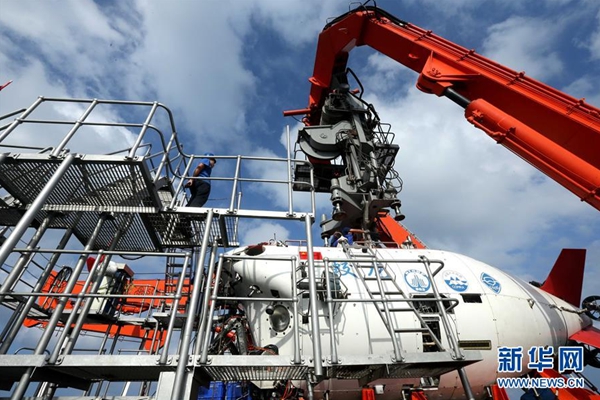|

|
|
Chinese submersible Jiaolong completed four dives in the South China Sea within five days. [Photo/Xinhua]
|
Jiaolong, China’s manned submersible, conducted its fourth dive Sunday around the Zhenbei Seamount in the South China Sea.
Jiaolong stayed underwater for eight hours in its fourth dive in the second stage of China’s 38th ocean scientific expedition, which will last until May 13, authorities said Monday.
The maximum depth of the dive was 1,101 meters beneath the sea surface, where it retrieved a number of basalt samples.
In the meantime, it collected a 0.7-kilogram sample of foraminifer grit at the depth of 630 meters, and brought back samples of sediments and seawater near the seabed as well as high-definition photos and video footages.
“We have also caught sight of corals, sea lilies, anemones, and large fishes like sharks above 420 meters,” said Yang Gang, a senior engineer on board the submersible. Yang said that the new discoveries could shed new light on the study of the South China Sea’s formation and evolution, biodiversity, and the cause of the seamount chain in the area.
Instead of using trawling as a sampling method, Jiaolong is able to conduct refined sampling mission and obtain ample samples, said Shi Xuefa, a researcher with the State Oceanic Administration.
Jiaolong has completed four dives in the South China Sea within five days. The submersible has went through full maintenance on Monday, including its propelling and electrical systems.
“The 38th ocean scientific expedition will be the furthest and longest voyage for Jiaolong in terms of distance and time,” said Wu Changbin, general commander of the second stage of the expedition. “Jiaolong will also complete the largest number of tasks since its operation.”
The 38th oceanic scientific expedition started on Feb. 6. Jiaolong completed a dive in the northwestern Indian Ocean earlier this year in the mission’s first stage. It will also conduct surveys in the Yap Trench and the Mariana Trench in the third stage.
Named after a mythical dragon, Jiaolong reached its deepest depth of 7,062 meters in the Mariana Trench in June 2012.
